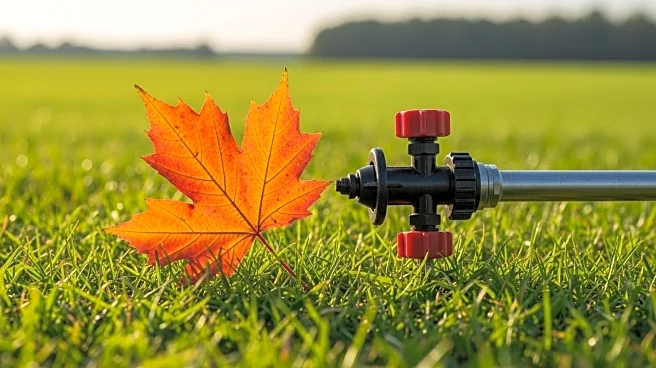What is the story about?
What's Happening?
A recent study published by the Weed Science Society of America (WSSA) highlights the effectiveness of fall-applied residual herbicides in controlling glyphosate-resistant (GR) Italian ryegrass, a significant weed problem in Mississippi's rice production. The research, conducted by Jason A. Bond and his team at Mississippi State University's Delta Research and Extension Center, evaluated the control of GR Italian ryegrass using fall-applied residual herbicide mixtures and sequential preemergence (PRE) followed by postemergence (POST) herbicide programs. The study found that herbicides such as dimethenamid-P, pyroxasulfone, and S-metolachlor provided over 94% control of the weed 21 days after treatment. The research underscores the necessity of incorporating fall-applied residual herbicides into GR Italian ryegrass control programs to ensure effective management.
Why It's Important?
The findings of this study are crucial for rice producers in Mississippi, where GR Italian ryegrass poses a significant challenge. Effective weed management is essential for maintaining crop yields and reducing production costs. By utilizing fall-applied residual herbicides, farmers can achieve better control of this resistant weed, potentially leading to more stable rice production and economic benefits. The study's results also provide a framework for developing more effective weed management strategies, which could be adapted to other regions facing similar challenges with resistant weeds. This research contributes to the broader agricultural community's understanding of sustainable weed control practices.
What's Next?
The study suggests that further research could explore the long-term impacts of these herbicide programs on weed resistance and crop health. Additionally, the agricultural community may consider integrating these findings into broader weed management strategies, potentially influencing policy and best practices in rice production. Stakeholders, including farmers, agricultural extension services, and policymakers, may need to collaborate to disseminate these findings and implement effective control measures across affected regions.
Beyond the Headlines
The study raises important considerations about the sustainability of herbicide use and the potential for developing resistance in other weed species. It highlights the need for ongoing research and innovation in agricultural practices to address evolving challenges in crop production. The findings also emphasize the importance of balancing chemical control methods with other integrated pest management strategies to ensure long-term agricultural sustainability.
















